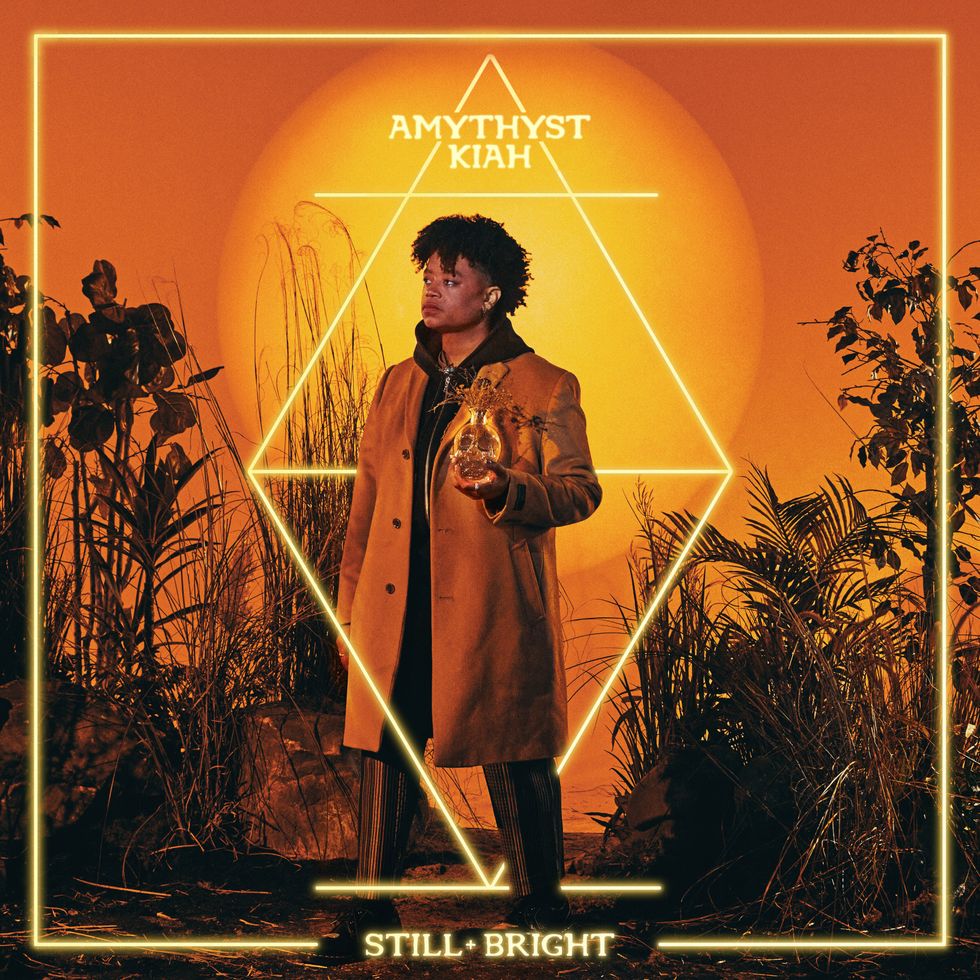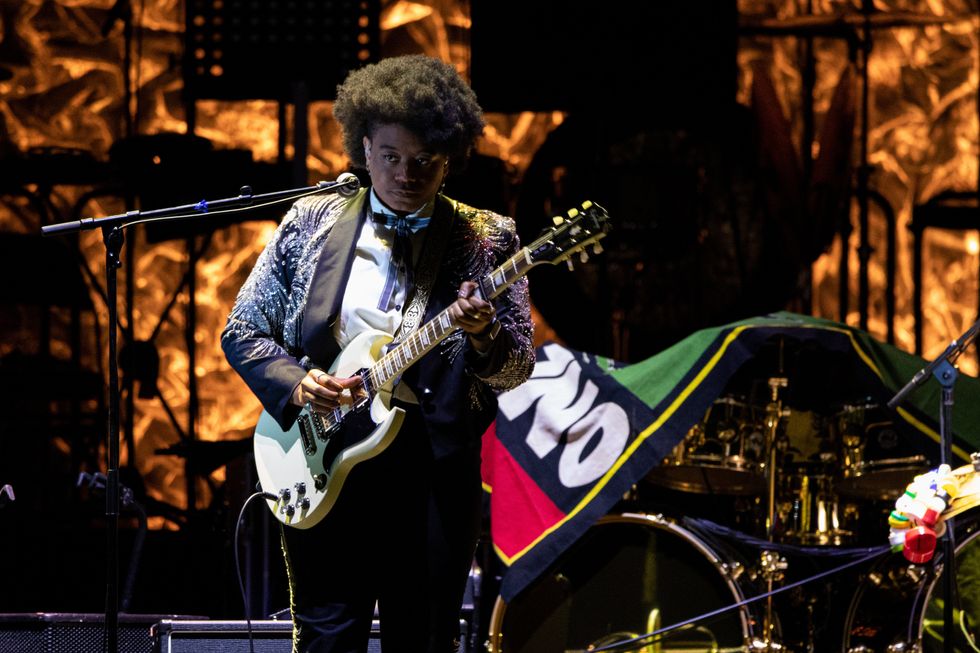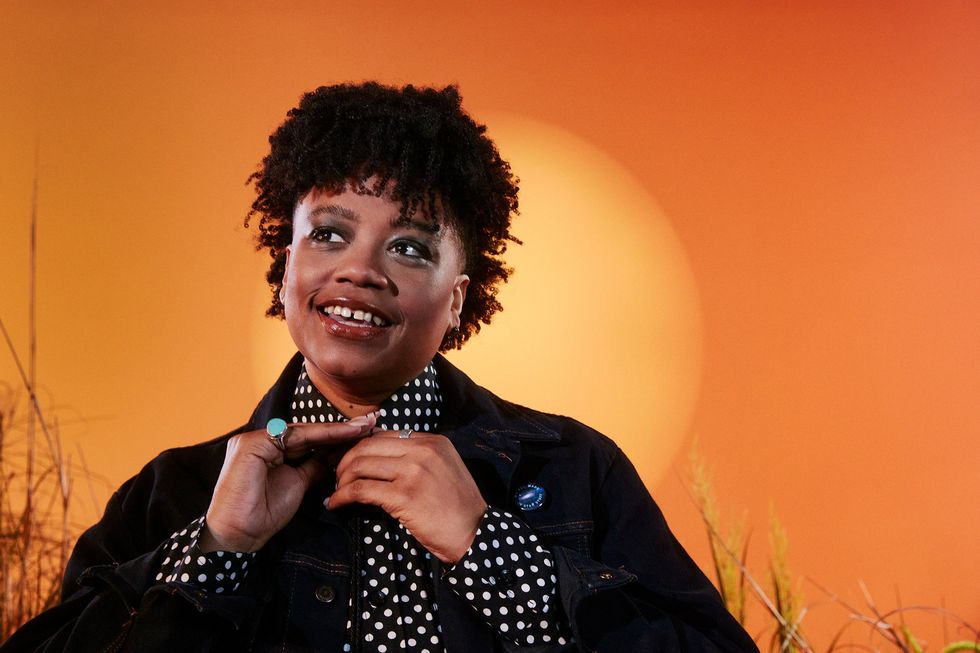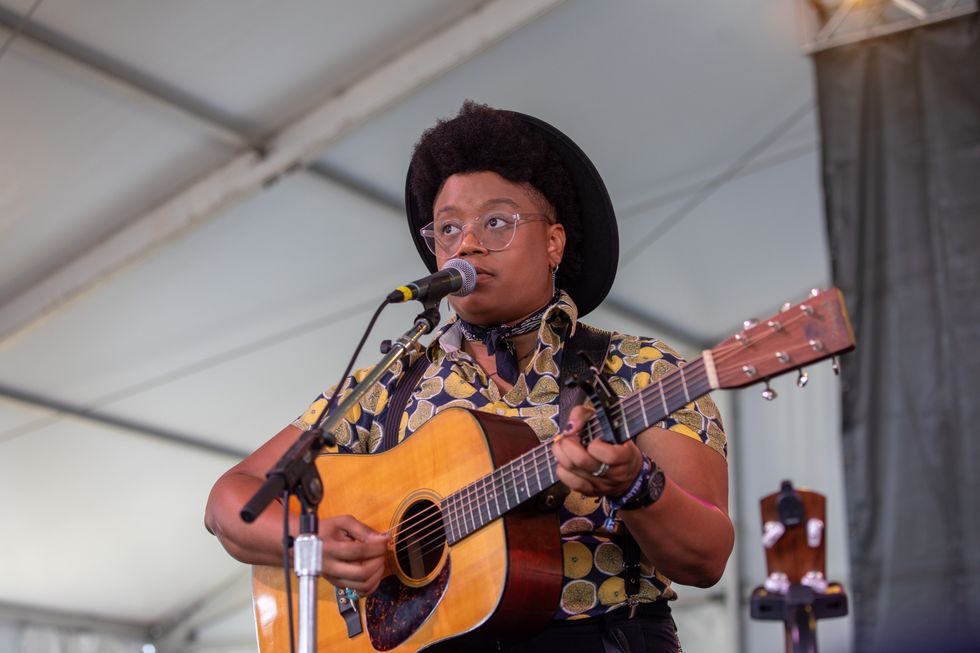Amythyst Kiah – “God’s Under the Mountain”
“I’ve stayed away from writing songs where I’m just strumming for a really long time,” she prefaces, “because I was worried that it was going to be too boring to not do fingerstyle. But then I realized, there’s so many [strummed] songs that are super powerful, and you can still make it interesting rhythmically.
“I started to listen to more rhythm guitar players, like Cory Wong, and reconfigured how I was viewing rhythm guitar,” she continues. “It was a matter of finding a way to do it that was exciting and interesting to me. Now, it’s really expanded the songs that I can write.”
All of the demos for Still + Brightbegan with strumming, says Kiah. When working on ideas, she would “play rhythmically as much as I could,” then open GarageBand, choose a tempo she felt comfortable playing to, and add programmed drums—often going with a modern R&B pattern. But when she brought her songs to the studio, she discovered that she was struggling to replicate the guitar parts she’d recorded at home.For Kiah, who’s always had a very strong sense of self and vision for her sound, that was a bit discomforting.

In the making of Still + Bright, Kiah’s fifth full-length album, the songwriter strengthened her skills as both a rhythm guitarist and a vocalist.
“I had a moment of, ‘I can either spend way too long trying to replay this part that I’ve been playing from muscle memory at this point,’” she shares, or hand it off to her session player, Nashville guitarist (and, coincidentally, Premier Guitarcolumnist) Ellen Angelico, and focus on her lyrics and vocal delivery instead. “I used to be very much like, ‘I have to be playing guitar on everything.’ But there’s a team of people here that can help, and make things go along more smoothly. My ego shouldn’t be getting in the way.”
She did, ultimately, play guitar—acoustic or electric, or both—on five out of 12 tracks, and banjo on two. Angelico performed on each track, alternating between mandolin, dobro, pedal steel, and acoustic, electric, and baritone guitar. (You’ll also hear Billy Strings, with his unmistakable, rapid-fire bluegrass licks, on “I Will Not Go Down.”)
The finished album exudes a spirit of triumph. It rings as one extended anthem, beginning with “Play God and Destroy the World,” a reflection on a childhood rejection of religious hypocrisy, and ending on “People’s Prayer,” an avowal of humanistic compassion. “S P A C E,” one of the more pensive songs in the collection, features Kiah playing clawhammer banjo. “God’s Under the Mountain” builds and undulates with a communion of syncopated vocal melody, fiddle, pedal steel, dobro, and background vocals by producer Butch Walker and Avi Kaplan. Then, the waltzing “Dead Stars” unwinds with simpler, judicious instrumentation supporting a mournful theme, before swelling with Morricone-like eloquence as it closes. “This is the first album where I really had a concept about everything, from the logo to the color palette, and everything else,” says Kiah, “and I had an incredible team who was able to really bring to life what I was envisioning.”
Amythyst Kiah’s Gear

Some of Kiah’s building blocks for her fingerpicking abilities came from classical training in high school and old-time studies at East Tennessee State University.
Photo by Tim Bugbee/tinnitus photography
Effects
- L.R. Baggs Para Acoustic DI
- TC Electronic Polytune
Strings, Picks & Accessories
- Acoustic: D’Addario light
- Electric: Ernie Ball medium
- Dunlop .73 mm picks
- Paige capo
Throughout the record, Kiah’s propulsive singing voice is the glowing flame to the hearth, acting as a centerpiece to the already luminous, Americana-fueled full-band arrangements. Like rhythm guitar, voice was another essential element that she cultivated while creating Still + Bright.
“I kind of diminished that power of having a voice,” she admits, explaining how she’s always been preoccupied with measuring up on guitar, and has long held multi-instrumentalists such as Prince in high esteem. But something shifted when a sentiment expressed by her manager, Dolph Ramseur, years ago, finally sunk in. “He said, ‘Amythyst, you know, you could just stand in a room and sing a cappella, and people would sit there and listen, and they wouldn’t get up and leave, and they would not be bored.’ And then it really dawned on me—it’s a powerful thing, people that can just sing; there’s a power and strength there, too. It’s just understanding where the power lies, and then embracing it, as opposed to feeling inadequate.
“It’s just understanding where the power lies, and then embracing it, as opposed to feeling inadequate.”
“I have this ongoing obsession in the back of my mind that I’m never doing enough,” she continues. “So, anytime I remove something from the equation, I worry. That stems from social anxiety, and being overly concerned with, like, ‘Am I making the right decision?’ But it doesn’t matter how long I agonize or rethink or redo something; at the end of the day, the decision I make is still going to be spontaneous. Because there’s only ever ‘now.’” She adds, laughing, “I’m a big Alan Watts fan.”
Now, she’s started doing vocal warmups before shows, “and through that, I’ve expanded my range and I’ve also been able to gain even more control over my voice. It also means that I can write more challenging songs. Those two things—expanding [rhythm] guitar and expanding voice—have let me open a whole new side to my sound.”
Spiritual themes appear frequently on Still + Bright, in both Kiah’s song titles and lyrics. The opening lines of “Empire of Love” include, “My religion is none at all / I build my own cathedrals and let ’em fall.” On “Let’s See Ourselves Out,” she sings, “So many matrices we create to escape / Sometimes I wonder if we’re just a mistake.” And, on more than one song, there’s mention of how “we’re all made from stars from above,” alluding to the scientific evidence that the elements of the human body were created by stars that went supernova.
Kiah was raised in a predominantly white, Christian suburb in Chattanooga, Tennessee, as part of a Black family who didn’t attend church. She identified as an “alternative” kid, vacillating between agnosticism and atheism, shopping at Hot Topic, and drawing inspiration from The Matrix’s theme of breaking free from societal constraints. (She remarks on her younger self’s “cognitive dissonance” of buying “‘alternative clothes’ at the mall.”) As a self-proclaimed introvert, she dealt with social anxiety, and spent a lot of her time at home alone on the computer. But when she began learning guitar at 13, and later started attending a creative arts high school, she finally felt like she fit in: “’cause everybody there was misfits and weirdos.”

Spirituality is a common theme in Kiah’s music. Her current beliefs draw mainly on principles of Zen Buddhism and Taoism.
Photo by Kevin & King
Though still adamantly individualistic, her spiritual views evolved when she took courses in both Western humanities and Eastern religion in college: “I realized that people have created narratives about how to live our lives for thousands of years. So, this idea that only one group of people got it right and everyone else is wrong; that threw all of that out the window.” Today, she says that Zen Buddhism probably best captures her personal belief system, but, “I hesitate to call myself a Zen Buddhist because I feel like I still have more to learn,” she says. She also rereads the Tao Te Ching by Laozi “pretty regularly,” lauding the principles of Taoism as another strong influence on her philosophies.
At the beginning of our 1 p.m. Zoom call, Kiah shares that she typically spends her mornings alone and in silence, meditating, writing, and reading, and lightheartedly apologizes for enthusiastically “going on”—saying she’s had a lot of time to think before speaking to another person. When I ask her about what modern artists she’s listening to lately, she has more to say about what she’s been reading. One of the books in her current rotation is The Lost Art of Silence by Sarah Anderson.

Growing up, Kiah identified as an “alternative” kid, and was something of an “anime mall goth” who often shopped at Hot Topic.
Photo by Tim Bugbee/tinnitus photography
“It goes along really well with meditation and learning to live in the present,” Kiah says. “It’s been interesting to explore those different perspectives on silence, and make more of an effort to find time in my life to be quiet. I find that I’m getting more and more comfortable with myself and my thoughts, and I feel less like I always have to block out anxious thoughts. Or, if I have anxiety about something, I can come up with an idea of, ‘Okay, well, how can I alleviate this? Can I do anything about it?’, and solve the problem as opposed to starting the spiral.
“Impostor syndrome was the big driver for my social anxiety, and now, I feel like I’m on the other side of being an impostor,” she reflects. “I’m doing what I’ve been wanting to do for the past 12 years, making a living doing this. There’s stressful things that happen, but you have to decide, what are you willing to be stressed out about? To try to seek a perfect, happy life where nothing ever upsets you—that’s called emotional repression and it’s really unhealthy. It’s just about accepting the fact that, hey, some days, some weeks are gonna be shit, and to find ways to take care of yourself that are as least self-destructive as humanly possible.”
“It doesn’t matter how long I agonize or rethink or redo something; at the end of the day, the decision I make is still going to be spontaneous. Because there’s only ever ‘now.’”
And while she’s outgrown a lot of her social anxiety, she says it’s been a challenge adapting to the stress that comes with the unpredictability of touring. “When I would be at home, I would establish this really tight routine, and then I got completely knocked on my feet when I would leave,” she explains. “I had to get to this point where I would just be focusing more on the present and less on trying to micromanage how my day’s going to be, because it’s not gonna always go the way that I want things to go.
“That’s been also helpful in my creative process, because then I’m not as anxious and worried about all these other things that I don’t have control over, and I’m able to just … enjoy the process of living.”
Ellen Angelico’s Gear
Guitars
- Dismal Ax Barnstormer
- Cervantes Telecaster
- GFI Expo S-10
- 1980s Kentucky KM-250S mandolin
Amp
Effects
- Peterson StroboStomp HD tuner
- Line 6 HX Stomp
- 1981 DRV
- MXR Timmy Overdrive Mini
- Electro-Harmonix Deluxe Memory Boy
- Strymon Flint
Strings & Picks
- D’Addario NYXL
- Wegen picks
YouTube It
On WDVX’s Blue Plate Special, recorded in Knoxville, Tennessee, Kiah performs an evocative, stripped-down version of “Empire of Love” from Still + Bright.









